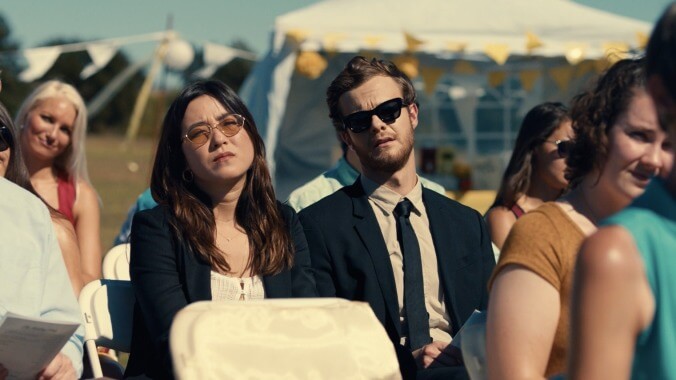The premise checks an almost unholy amount of rom-com boxes: weddings, faux-cynicism about weddings, the “devastating” break-up to provide an unconvincing red herring, the close friends who might develop feelings for one another… and is it possible that someone will bare their soul through a toast at some point, too? Crucially, though, the familiarity of Plus One isn’t entirely based on other movies. Plenty of people will recognize that time, often from their late 20s or early 30s, where seemingly every other weekend is booked with another friend or family member getting hitched, creating weird little guest communities in their wake.
Writer-directors Jeff Chan and Andrew Rhymer dedicate themselves to evoking that bittersweet sensation, even when they’re exercising plenty of well-worn tropes. Despite some background-filling furloughs away from wedding weekends, like the scenes with Ben squirming through talks with his divorced dad (Ed Begley Jr.), most of Plus One is about Ben and Alice insulting each other in hotel rooms, nudging each other toward ill-advised romantic encounters, and observing wedding toasts of widely varying, mostly low quality. The quality of the movie’s jokey banter, on the other hand, is largely on the higher side: believably conversational, not too quippy, and only occasionally over-pleased with its frankness.
Even if this is another movie desperate to treat the very utterance of “vagina” as a shocking, transgressive punchline, Erskine can make her weaker lines sound good, and her good lines sound better. Her performance brings a shticky comic type—the messy give-no-fucks woman who also cleans up conveniently well—down to the terra firm of recognizable behavior, and Chan and Rhymer (who also wrote an episode of Erskine’s show Pen15) seem to fully understand how charming she is. Quaid, whether through his performance or the writing, doesn’t fare quite so well, sometimes coming across a bit like a poor man’s Jim Halpert without the benefit of deadpan camera-takes.
Regardless, he and Erskine make a cute couple, casually combusting that peculiar chemistry that’s supposed to be obvious to the audience and various side characters, but somehow obscured to them (though the movie doesn’t make them nearly as oblivious as they could be). Their obligatory realization—or part of it, anyway—happens during a long post-midnight walk-and-talk through an empty downtown strip, a pedestrian setting that cinematographer Guy Godfree makes over into a romantic one. Even more lavishly budgeted contemporary rom-coms often land between indifferent-looking and gauzily overlit nightmares, so it’s an eye-soothing relief that Plus One often takes on the dusky warmth of an indie.
Technically, of course, it is an indie. But it’s also a spiritual successor to studio movies that don’t appear that often anymore. This is what Netflix rom-coms are aiming for, and also what plenty of them miss in a flush of infatuation with their self-conscious comfort-food status. Plus One isn’t much more than consistently amusing and sweetly romantic, but in the right hands, those qualities can still feel like a lot.








![HBO teases new Euphoria, Larry David, and much more in 2026 sizzle reel [Updated]](https://img.pastemagazine.com/wp-content/avuploads/2025/12/12100344/MixCollage-12-Dec-2025-09-56-AM-9137.jpg)

































